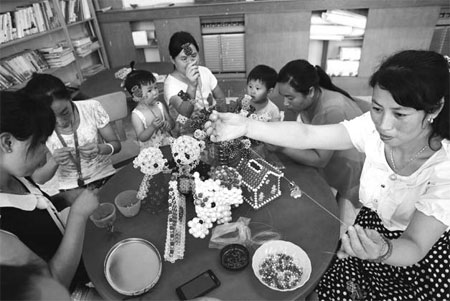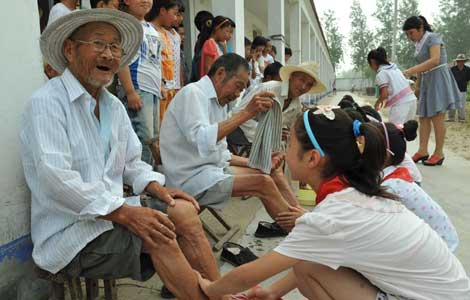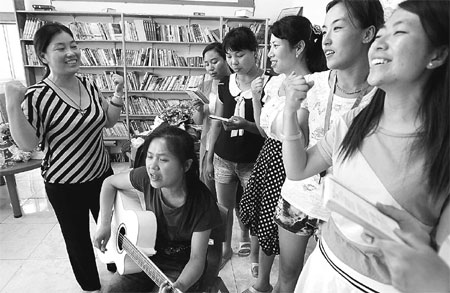Connecting community
Updated: 2013-07-02 06:19
By Tang Zhe (China Daily)
|
||||||||
|
Above: Qi Lixia (left) arranges a singing group for women migrant workers at the Mulan community activity center in Changping district, Beijing. Below: Women in a handiwork group spend their spare time producing handicrafts. Photos by Zhang Wei / China Daily |


A community activity center operating in Beijing is aiming to give migrant women an outlet for fun and friends. Tang Zhe reports.
In every major city in China, you will find a certain group of women.
They are the women who left their hometowns after middle school to work in factories in big cities. They return home at about age 24, caving to family pressure to marry and have a baby. They then return to the cities for work, their children left at home to be raised by their grandparents.
If a woman is over 25 or has a child, she will struggle to find work in a standard factory and be forced to take a job in a mill where the working conditions are often poor. Older women are believed to be slower and less skilled.
Former factory worker Qi Lixia knows all too well the life of the women working on the assembly lines far from home.
"The most laborious job I had required us to work on the assembly line for 14 hours a day, sometimes even overnight," says the Henan native, who left her 3-year-old son at home to travel to Guangdong province's Shenzhen with her husband in 2002.
"When I worked in a factory producing bicycle belts, I was so afraid of being slow that I dreamed about being scolded by the manager. There was huge pressure.
"The girls always have lots of beautiful dreams, but when they have to get up at 7 in the morning and work untill 11 at night, all those dreams and your sense of self just disappears," Qi says.
But Qi's life changed when she came into contact with a nonprofit organization operating near her factory in Shenzhen.
"The organization mainly taught the women how to protect themselves in romantic relationships, since most of the workers in Shenzhen are women, and they tend to find comfort in love because of the pressure of work and loneliness," Qi says.
"It also taught us how to protect our rights through legal processes and organized several hobby groups, such as literature, law and dance groups."
The classes had a life-changing effect on Qi, and she decided to help her peers to also break up their monotonous routines.
After one year helping the organization as a volunteer, she was offered a full-time job at the center that she held for four years.
At the end of 2008, Qi moved to Beijing and with two friends started a community activity center to provide cultural and educational services for women migrant workers in the capital's Changping district.
They named the center "Mulan", after China's legendary heroine Hua Mulan, who takes her aged father's place in the army, making her a symbol of brave and independent Chinese women.
Mulan could also represent the beauty of women because of the Mulan magnolia.
"We found most of the women coming to the metropolis from the countryside have no cultural or entertainment outlets, whether they were working or taking care of children at home," says Qi, who brought her son with her to Beijing.
"All they talk about are family and children. They barely have any sense of themselves," Qi says. "Sometimes people live in the same village but don't know each other. What we want to do is to unite everybody, to face problems in work and life together."
Between 2010 and 2012, Mulan had no financial support and had to pay rent by selling secondhand goods donated by universities, but the community center is now attracting more supporters.
Xi Xilin, who came to Beijing from Zhangjiakou, Hebei province, more than 10 years ago, says she has become more confident and talkative after joining Mulan.
Xi has worked many jobs in Beijing, from selling hair accessories on the roadside to cutting around 400 kg of vegetables a day in restaurants. She became a housewife after giving birth to her second child.
"I have no friends or relatives here and spent most of my time at home disconnected from society, which made me feel lonely and inferior," Xi says. "I didn't know how to express myself in the past, but now I can talk with ease."
The mother of two says she also learned how to educate children in the center's parents' class. She is now better at communicating with her kids and the atmosphere in her family has improved.
The center now runs computer classes, singing teams, reading groups and a handiwork group. Qi hopes to add more classes.
"Our service now focuses on spiritual needs, but we found there are many mothers who can't find a full-time job because they are taking care of babies, so we want to explore developing a business, such as selling handicrafts and distributing the income equitably between them," Qi says. "However, none of us has experience in product design and sales, and we hope we will attract some warmhearted experts to help us in this field," she says.
Note: If you have clothes, household appliances and books you no longer use, please donate to the Mulan Community Activity Center at Dong Shagezhuang village, Beiqijia town of Changping district. Tel: 010-5843-5256 or 15313509292.
Contact the writer at tangzhe@chinadaily.com.cn.
(China Daily USA07/02/2013 page10)

 Egypt army gives Mursi 48 hours to share power
Egypt army gives Mursi 48 hours to share power
 No quick end in sight for Beijing smog
No quick end in sight for Beijing smog
 New filial law sparks debate
New filial law sparks debate
 Bakelants claims Tour de France second stage
Bakelants claims Tour de France second stage
 2013 BET Awards in Los Angeles
2013 BET Awards in Los Angeles
 Gay pride parade around the world
Gay pride parade around the world
 Four dead in Egypt clashes, scores wounded
Four dead in Egypt clashes, scores wounded
 New NSA spying allegations rile European allies
New NSA spying allegations rile European allies
Most Viewed
Editor's Picks

|

|

|

|

|

|
Today's Top News
Kerry hails China's denuclearization bid
19 firefighters killed in Arizona fire
Book reveals islands' true history
Tokyo warned not to resort to 'empty talk'
Snowden applies for Russian asylum
No quick end in sight for Beijing smog
New home prices defy curbs
Mandela 'still critical but stable'
US Weekly

|

|







